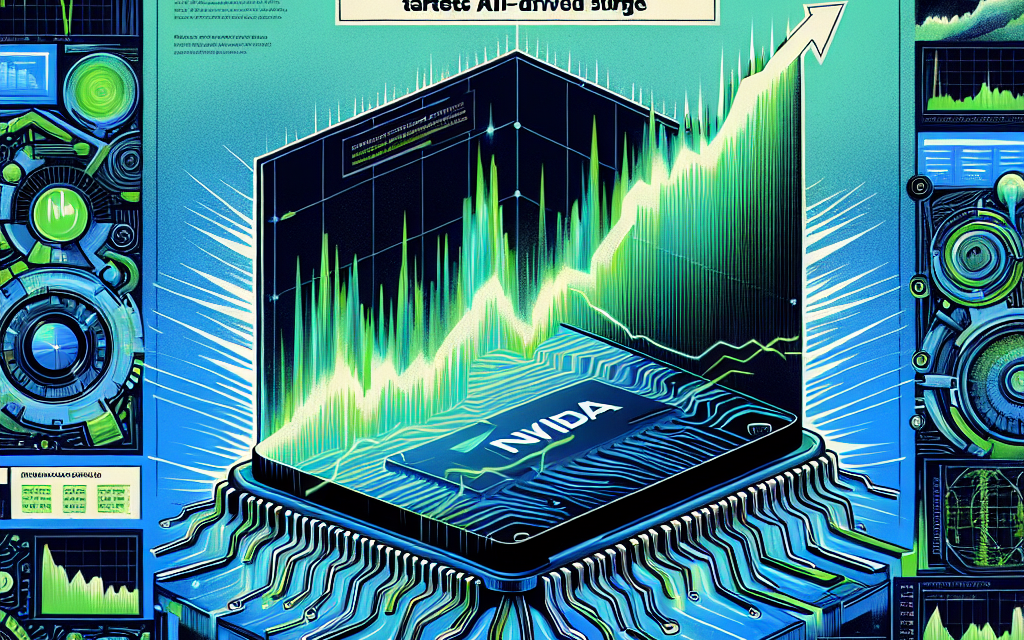“Nvidia: Steady as a Rock, Poised for an AI-Driven Surge!”
Introduction
Nvidia continues to demonstrate resilience in the stock market as it maintains its position on the IBD 50 list, a selection of top-performing growth stocks. With a strong focus on artificial intelligence (AI) technologies, Nvidia is poised for significant growth, driven by increasing demand for AI applications across various industries. The company’s innovative products and strategic initiatives position it well to capitalize on the ongoing AI-driven surge, making it a key player in the tech sector and an attractive option for investors seeking exposure to this rapidly evolving market.
Nvidia’s Role in the AI Revolution
Nvidia has emerged as a pivotal player in the ongoing artificial intelligence (AI) revolution, solidifying its position as a leader in the technology sector. As businesses and industries increasingly turn to AI to enhance efficiency and drive innovation, Nvidia’s advanced graphics processing units (GPUs) have become indispensable tools for developers and researchers alike. The company’s commitment to pushing the boundaries of AI technology has not only fueled its growth but has also positioned it as a cornerstone of the broader AI ecosystem.
At the heart of Nvidia’s success is its ability to provide the computational power necessary for training complex AI models. The demand for such capabilities has surged in recent years, driven by the proliferation of data and the need for sophisticated algorithms that can analyze and interpret this information. Nvidia’s GPUs, designed specifically for parallel processing, excel in handling the massive datasets required for deep learning applications. This unique advantage has allowed Nvidia to capture a significant share of the AI market, as organizations seek to leverage its technology to gain a competitive edge.
Moreover, Nvidia’s strategic investments in AI research and development have further cemented its role in the industry. The company has consistently introduced innovative products that cater to the evolving needs of AI practitioners. For instance, the launch of the Nvidia A100 Tensor Core GPU marked a significant milestone, as it was engineered to accelerate AI workloads across various sectors, including healthcare, finance, and autonomous vehicles. By continuously enhancing its product offerings, Nvidia not only meets the current demands of the market but also anticipates future trends, ensuring its relevance in an ever-changing landscape.
In addition to its hardware advancements, Nvidia has also made substantial strides in software development. The introduction of the Nvidia CUDA platform has empowered developers to harness the full potential of its GPUs, enabling them to create more efficient and powerful AI applications. This software ecosystem, combined with robust hardware, has attracted a diverse range of customers, from startups to established enterprises, all eager to tap into the transformative power of AI. As a result, Nvidia has cultivated a loyal customer base that relies on its technology to drive their own innovations.
Furthermore, Nvidia’s collaborations with leading research institutions and technology companies have amplified its influence in the AI space. By partnering with organizations at the forefront of AI research, Nvidia not only gains access to cutting-edge developments but also contributes to the advancement of the field as a whole. These collaborations have led to breakthroughs in various applications, from natural language processing to computer vision, showcasing the versatility and adaptability of Nvidia’s technology.
As the AI landscape continues to evolve, Nvidia remains well-positioned to capitalize on emerging opportunities. The company’s proactive approach to addressing the challenges associated with AI, such as ethical considerations and data privacy, demonstrates its commitment to responsible innovation. By fostering a dialogue around these critical issues, Nvidia not only enhances its reputation but also contributes to the establishment of industry standards that promote the ethical use of AI technologies.
In conclusion, Nvidia’s steadfast role in the AI revolution is underscored by its technological advancements, strategic partnerships, and commitment to responsible innovation. As the demand for AI-driven solutions continues to grow, Nvidia’s influence is likely to expand, making it a key player in shaping the future of technology. With its unwavering focus on innovation and excellence, Nvidia is poised to lead the charge in the AI-driven surge that is transforming industries worldwide.
Analyzing Nvidia’s Stock Performance
Nvidia has emerged as a pivotal player in the technology sector, particularly in the realm of artificial intelligence (AI). As the demand for AI-driven solutions continues to escalate, Nvidia’s stock performance has garnered significant attention from investors and analysts alike. The company’s innovative approach to graphics processing units (GPUs) has positioned it at the forefront of the AI revolution, making it a key component of the IBD 50 list, which highlights leading growth stocks. This recognition underscores Nvidia’s potential for sustained growth, particularly as industries increasingly integrate AI technologies into their operations.
In recent months, Nvidia’s stock has demonstrated remarkable resilience, even amid broader market fluctuations. This stability can be attributed to several factors, including the company’s robust financial performance and its strategic investments in AI research and development. For instance, Nvidia reported impressive earnings that exceeded analysts’ expectations, showcasing its ability to capitalize on the surging demand for AI applications. This financial strength not only reinforces investor confidence but also positions Nvidia favorably for future growth opportunities.
Moreover, Nvidia’s commitment to innovation is evident in its continuous product enhancements and the introduction of cutting-edge technologies. The company has expanded its GPU offerings to cater to a diverse range of applications, from gaming to data centers and autonomous vehicles. This diversification not only mitigates risks associated with reliance on a single market segment but also opens new revenue streams. As industries increasingly adopt AI solutions, Nvidia stands to benefit significantly from its comprehensive product portfolio, which is designed to meet the evolving needs of its customers.
In addition to its product innovations, Nvidia’s strategic partnerships and collaborations further bolster its market position. By aligning with key players in the tech industry, Nvidia enhances its capabilities and accelerates the development of AI technologies. These partnerships not only facilitate knowledge sharing but also enable Nvidia to leverage complementary strengths, thereby driving innovation and expanding its market reach. As a result, the company’s stock performance is likely to reflect the positive outcomes of these collaborative efforts, reinforcing its status as a leader in the AI space.
Furthermore, the broader market trends indicate a growing recognition of the importance of AI across various sectors. As businesses increasingly seek to harness the power of AI to improve efficiency and drive growth, Nvidia’s role as a provider of essential technology becomes even more critical. This trend is expected to fuel demand for Nvidia’s products, thereby contributing to its stock performance. Investors are keenly aware of this potential, which is reflected in the stock’s steady upward trajectory.
In conclusion, Nvidia’s stock performance is a testament to its strategic positioning within the rapidly evolving AI landscape. The company’s strong financial results, commitment to innovation, and strategic partnerships collectively contribute to its resilience and growth potential. As industries continue to embrace AI technologies, Nvidia is well-positioned to capitalize on this trend, making it a compelling choice for investors seeking exposure to the burgeoning AI market. With its inclusion in the IBD 50 list, Nvidia not only highlights its current success but also signals a promising future as it targets an AI-driven surge. As the company continues to navigate the complexities of the tech landscape, its ability to adapt and innovate will be crucial in maintaining its competitive edge and delivering value to shareholders.
Future Projections for Nvidia in AI Markets
Nvidia has established itself as a formidable player in the rapidly evolving landscape of artificial intelligence (AI), and its future projections in this sector are increasingly optimistic. As industries across the globe continue to integrate AI technologies into their operations, Nvidia’s role as a leading provider of graphics processing units (GPUs) positions it favorably for sustained growth. The company’s GPUs are not only essential for gaming but have also become critical components in AI training and inference processes, which are fundamental to the development of machine learning models.
In recent years, Nvidia has made significant strides in enhancing its product offerings to cater to the burgeoning demand for AI capabilities. The introduction of the A100 Tensor Core GPU, for instance, has been a game-changer, enabling organizations to accelerate their AI workloads. This innovation has not only solidified Nvidia’s reputation as a pioneer in the field but has also attracted a diverse clientele, ranging from tech giants to startups. As businesses increasingly recognize the importance of AI in driving efficiency and innovation, Nvidia’s market share is likely to expand, further solidifying its leadership position.
Moreover, the company’s strategic partnerships with major cloud service providers, such as Amazon Web Services and Microsoft Azure, have opened new avenues for growth. These collaborations allow Nvidia to integrate its AI technologies into cloud platforms, making it easier for enterprises to access powerful computing resources without the need for substantial upfront investments. As more organizations migrate to the cloud and seek to leverage AI for competitive advantage, Nvidia stands to benefit significantly from this trend.
In addition to its hardware advancements, Nvidia is also investing heavily in software solutions that complement its GPU offerings. The development of the Nvidia AI Enterprise software suite exemplifies this approach, providing businesses with the tools necessary to deploy AI applications seamlessly. By offering a comprehensive ecosystem that includes both hardware and software, Nvidia is positioning itself as a one-stop shop for organizations looking to harness the power of AI. This holistic strategy not only enhances customer loyalty but also creates additional revenue streams, further bolstering the company’s financial outlook.
Looking ahead, the global push towards AI adoption is expected to accelerate, driven by advancements in technology and increasing awareness of AI’s potential benefits. Analysts predict that the AI market will experience exponential growth in the coming years, with Nvidia poised to capture a significant share of this expansion. The company’s ongoing investments in research and development are likely to yield innovative solutions that address emerging challenges in AI, ensuring that it remains at the forefront of the industry.
Furthermore, as regulatory frameworks around AI continue to evolve, Nvidia’s proactive approach to compliance and ethical AI development will likely enhance its reputation and appeal among stakeholders. By prioritizing responsible AI practices, Nvidia can differentiate itself from competitors and build trust with customers, which is essential in an era where data privacy and ethical considerations are paramount.
In conclusion, Nvidia’s future projections in the AI markets are characterized by a combination of strategic innovation, robust partnerships, and a commitment to ethical practices. As the demand for AI technologies continues to surge, Nvidia is well-positioned to capitalize on this trend, ensuring its status as a leader in the industry for years to come. With a solid foundation and a forward-looking vision, Nvidia is not just holding steady; it is gearing up for an AI-driven surge that promises to reshape the technological landscape.
Key Innovations Driving Nvidia’s Growth
Nvidia has emerged as a pivotal player in the technology sector, particularly in the realm of artificial intelligence (AI). The company’s sustained growth can be attributed to a series of key innovations that have not only solidified its market position but also set the stage for future advancements. At the heart of Nvidia’s success is its cutting-edge graphics processing units (GPUs), which have evolved significantly over the years. Initially designed for rendering high-quality graphics in video games, these GPUs have found new applications in AI and machine learning, enabling complex computations at unprecedented speeds.
One of the most notable innovations is the introduction of the Nvidia Ampere architecture, which has redefined performance benchmarks in the industry. This architecture enhances the efficiency of data processing, allowing for faster training of AI models. As businesses increasingly turn to AI to drive decision-making and operational efficiency, the demand for powerful computing solutions has surged. Nvidia’s GPUs, particularly the A100 and H100 models, have become essential tools for enterprises looking to harness the power of AI, thereby positioning the company as a leader in this burgeoning market.
Moreover, Nvidia’s commitment to research and development has led to the creation of specialized hardware tailored for AI applications. The company has developed Tensor Cores, which are specifically designed to accelerate deep learning tasks. This innovation not only improves the speed of AI model training but also enhances the performance of inference tasks, where trained models are deployed to make predictions. As a result, Nvidia’s technology is increasingly being integrated into various sectors, including healthcare, automotive, and finance, where AI applications are becoming more prevalent.
In addition to hardware advancements, Nvidia has also made significant strides in software development. The introduction of the Nvidia CUDA platform has revolutionized the way developers approach parallel computing. By providing a robust framework for programming GPUs, CUDA has enabled a wide range of applications beyond gaming, including scientific simulations and data analytics. This software ecosystem complements Nvidia’s hardware offerings, creating a comprehensive solution that appeals to a diverse array of industries.
Furthermore, Nvidia’s strategic acquisitions have bolstered its capabilities in AI and machine learning. The acquisition of Mellanox Technologies, for instance, has enhanced Nvidia’s data center offerings, allowing for faster data transfer and improved performance in AI workloads. This move not only strengthens Nvidia’s position in the data center market but also aligns with the growing trend of cloud computing, where businesses are increasingly relying on powerful infrastructure to support their AI initiatives.
As the demand for AI-driven solutions continues to escalate, Nvidia is well-positioned to capitalize on this trend. The company’s innovations in both hardware and software have created a robust foundation for growth, enabling it to meet the evolving needs of its customers. Additionally, Nvidia’s proactive approach to partnerships and collaborations with leading tech firms further amplifies its reach and influence in the AI landscape. By fostering an ecosystem that encourages innovation and collaboration, Nvidia is not only driving its own growth but also contributing to the broader advancement of AI technology.
In conclusion, Nvidia’s steady ascent in the technology sector can be attributed to its relentless pursuit of innovation. Through advancements in GPU architecture, specialized hardware for AI, and a comprehensive software ecosystem, the company has established itself as a leader in the AI revolution. As industries increasingly adopt AI solutions, Nvidia’s strategic initiatives position it to thrive in this dynamic environment, making it a key player in shaping the future of technology.
Comparing Nvidia with Competitors in AI
Nvidia has established itself as a dominant player in the artificial intelligence (AI) sector, particularly through its advanced graphics processing units (GPUs) that are essential for AI computations. As the demand for AI technologies continues to surge, Nvidia’s position in the market becomes increasingly significant. However, it is essential to compare Nvidia with its competitors to understand the broader landscape of AI-driven innovation and investment opportunities.
One of Nvidia’s primary competitors is AMD (Advanced Micro Devices), which has made substantial strides in the GPU market. AMD’s Radeon series has gained traction, particularly in gaming and professional graphics. While AMD has been successful in capturing a portion of the market, it still lags behind Nvidia in terms of AI-specific applications. Nvidia’s CUDA architecture, which allows developers to leverage the parallel processing capabilities of GPUs for AI tasks, remains a significant advantage. This proprietary technology has fostered a robust ecosystem of developers and applications that rely on Nvidia’s hardware, thereby solidifying its leadership in the AI domain.
Another notable competitor is Intel, which has traditionally dominated the CPU market but is now making aggressive moves into the GPU space. Intel’s Xe graphics architecture aims to compete with Nvidia’s offerings, particularly in data centers and AI workloads. However, Intel faces challenges in gaining market share, as it must overcome the established reputation and performance benchmarks set by Nvidia. Furthermore, Intel’s transition into the GPU market has been met with delays and production challenges, which could hinder its ability to compete effectively in the rapidly evolving AI landscape.
In addition to AMD and Intel, companies like Google and Amazon are also emerging as significant players in the AI sector, albeit from a different angle. Both tech giants have developed their own AI chips—Google with its Tensor Processing Units (TPUs) and Amazon with its Inferentia chips. These custom-designed chips are optimized for specific AI tasks, such as machine learning and deep learning, and are primarily used within their respective cloud services. While these companies do not directly compete with Nvidia in the consumer GPU market, they represent a shift in how AI processing is approached, emphasizing the importance of tailored solutions for specific applications.
Moreover, startups and smaller companies are also entering the AI hardware space, seeking to carve out niches that could challenge established players like Nvidia. For instance, companies focusing on neuromorphic computing and specialized AI accelerators are gaining attention for their innovative approaches to processing AI workloads. While these startups may not yet pose a significant threat to Nvidia’s market share, their advancements could lead to disruptive technologies that reshape the competitive landscape in the future.
As Nvidia continues to innovate and expand its product offerings, it remains crucial for investors and industry observers to monitor the competitive dynamics within the AI sector. The company’s ability to maintain its leadership position will depend not only on its technological advancements but also on how effectively it responds to the strategies employed by its competitors. In this rapidly evolving market, where AI is becoming increasingly integral to various industries, Nvidia’s steady performance amidst growing competition highlights its resilience and adaptability. Ultimately, the ongoing developments in AI technology will shape the future of not only Nvidia but also the entire tech industry, making it an exciting space to watch for both investors and technology enthusiasts alike.
Investor Sentiment Around Nvidia’s Stability
Nvidia has emerged as a cornerstone in the technology sector, particularly in the realm of artificial intelligence (AI). As investor sentiment continues to evolve, the company’s stability has become a focal point for many market participants. The recent surge in demand for AI-driven solutions has positioned Nvidia as a key player, leading to heightened interest from both institutional and retail investors. This interest is not merely speculative; it is grounded in the company’s robust fundamentals and its strategic initiatives aimed at capitalizing on the burgeoning AI market.
The stability of Nvidia’s stock is underscored by its consistent performance metrics, which have attracted a diverse array of investors. Analysts have noted that the company’s revenue growth has outpaced many of its competitors, driven largely by its dominance in the graphics processing unit (GPU) market. These GPUs are essential for AI applications, making Nvidia a critical supplier for companies looking to harness the power of machine learning and deep learning technologies. As a result, investor confidence in Nvidia’s ability to maintain its market leadership has remained strong, even amid broader market fluctuations.
Moreover, Nvidia’s commitment to innovation plays a significant role in shaping investor sentiment. The company has consistently invested in research and development, ensuring that it remains at the forefront of technological advancements. This proactive approach not only enhances its product offerings but also reinforces its reputation as a leader in the AI space. Investors are increasingly recognizing that Nvidia’s technological edge is not just a temporary advantage; it is a sustainable competitive position that is likely to yield long-term benefits.
In addition to its technological prowess, Nvidia’s strategic partnerships and collaborations further bolster investor confidence. The company has forged alliances with major players in various industries, including automotive, healthcare, and cloud computing. These partnerships not only expand Nvidia’s market reach but also validate its technology as essential for the future of AI. As these collaborations continue to evolve, they are expected to generate additional revenue streams, further solidifying Nvidia’s financial stability.
Furthermore, the broader market trends surrounding AI have created a favorable environment for Nvidia. As businesses increasingly seek to integrate AI into their operations, the demand for high-performance computing solutions has surged. This trend is expected to persist, providing Nvidia with a steady stream of potential customers. Investors are keenly aware of this dynamic, which contributes to a positive outlook for the company’s stock performance.
However, it is essential to acknowledge that investor sentiment can be influenced by external factors, including regulatory changes and macroeconomic conditions. While Nvidia has demonstrated resilience in the face of challenges, any significant shifts in the regulatory landscape or economic downturns could impact its stock performance. Nevertheless, the company’s strong fundamentals and strategic positioning in the AI market provide a buffer against potential volatility.
In conclusion, Nvidia’s stability in the current market landscape is a testament to its strong fundamentals, commitment to innovation, and strategic partnerships. As investor sentiment continues to favor companies that are well-positioned to benefit from the AI revolution, Nvidia stands out as a prime candidate for those looking to capitalize on this trend. With its robust growth trajectory and unwavering focus on technological advancement, Nvidia is poised to maintain its status as a leader in the AI-driven surge, making it an attractive option for investors seeking stability in an ever-evolving market.
The Impact of AI on Nvidia’s Business Strategy
Nvidia has emerged as a pivotal player in the technology sector, particularly in the realm of artificial intelligence (AI). As the demand for AI-driven solutions continues to escalate, Nvidia’s business strategy has evolved to capitalize on this burgeoning market. The company’s focus on developing advanced graphics processing units (GPUs) has positioned it at the forefront of AI innovation, enabling it to cater to a diverse range of industries, from gaming to healthcare and autonomous vehicles.
The integration of AI into Nvidia’s business model is not merely a response to market trends; it is a fundamental aspect of its long-term vision. By leveraging its expertise in GPU technology, Nvidia has developed platforms that facilitate machine learning and deep learning applications. This strategic pivot has allowed the company to create a robust ecosystem that supports AI research and development, thereby attracting a wide array of customers, including tech giants and startups alike. As a result, Nvidia has solidified its reputation as a leader in AI hardware and software solutions.
Moreover, Nvidia’s commitment to AI is evident in its continuous investment in research and development. The company has allocated significant resources to enhance its AI capabilities, which has led to the introduction of groundbreaking products such as the Nvidia A100 Tensor Core GPU. This particular innovation has been instrumental in accelerating AI workloads, making it an essential tool for data centers and enterprises seeking to harness the power of AI. By prioritizing R&D, Nvidia not only strengthens its product offerings but also ensures that it remains competitive in an ever-evolving technological landscape.
In addition to its technological advancements, Nvidia has strategically partnered with various organizations to expand its reach within the AI sector. Collaborations with leading companies in cloud computing, automotive, and healthcare have enabled Nvidia to integrate its AI solutions into a wide range of applications. These partnerships not only enhance Nvidia’s market presence but also foster innovation by combining expertise from different fields. As a result, Nvidia is well-positioned to address the unique challenges faced by various industries, further solidifying its status as a key player in the AI domain.
Furthermore, the growing emphasis on AI across multiple sectors has created a favorable environment for Nvidia’s growth. As businesses increasingly recognize the potential of AI to drive efficiency and innovation, the demand for Nvidia’s products and services is expected to surge. This trend is particularly evident in industries such as finance, where AI algorithms are being utilized for risk assessment and fraud detection, and in healthcare, where AI is transforming diagnostics and patient care. By aligning its business strategy with these emerging trends, Nvidia is not only enhancing its revenue potential but also contributing to the broader adoption of AI technologies.
In conclusion, Nvidia’s steadfast focus on AI has significantly influenced its business strategy, positioning the company as a leader in the technology sector. Through continuous innovation, strategic partnerships, and a commitment to research and development, Nvidia is well-equipped to meet the growing demand for AI solutions. As the landscape of technology continues to evolve, Nvidia’s proactive approach ensures that it remains at the forefront of AI advancements, ultimately driving its success in an increasingly competitive market. The company’s ability to adapt and thrive in this dynamic environment underscores its pivotal role in shaping the future of AI and its applications across various industries.
Q&A
1. **What is the main focus of Nvidia’s recent performance?**
– Nvidia is focusing on its AI-driven growth, particularly in the data center and gaming sectors.
2. **What is the significance of the IBD 50 list?**
– The IBD 50 list highlights top growth stocks based on fundamental and technical analysis, indicating strong potential for investment.
3. **How has Nvidia’s stock been performing recently?**
– Nvidia’s stock has shown resilience and stability, maintaining its position among top growth stocks despite market fluctuations.
4. **What are the key drivers behind Nvidia’s growth?**
– Key drivers include increased demand for AI technologies, advancements in GPU technology, and expansion in cloud computing services.
5. **What role does AI play in Nvidia’s business strategy?**
– AI is central to Nvidia’s strategy, as the company develops products and solutions that cater to the growing AI market.
6. **What are analysts predicting for Nvidia’s future?**
– Analysts predict continued growth for Nvidia, driven by its leadership in AI and machine learning technologies.
7. **How does Nvidia’s performance compare to its competitors?**
– Nvidia is often seen as a leader in the GPU market, outperforming competitors in terms of innovation and market share in AI applications.
Conclusion
Nvidia’s consistent performance amidst market fluctuations highlights its strong position in the AI sector, making it a key player in the IBD 50. The company’s focus on AI-driven technologies positions it well for future growth, reinforcing investor confidence and suggesting potential for continued upward momentum.





